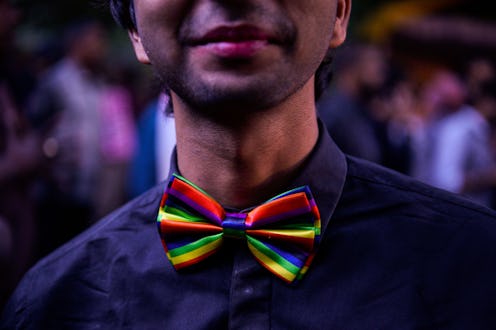
In recent years, colleges across the country have become more and more aware of how important it is to be inclusive of LGBTQIA+ students. In one step toward that goal, Kansas University has introduced pins with gender pronouns for its students to wear. This move sends the important message that others' preferred pronouns are worth thinking about and makes a powerful point about why it's so important not to assume anything based on stereotypes. (Bustle has reached out to Kansas University for comment.)
The pins, which are provided by the school's library, each read "he/him/his," "she/her/hers," or "they/them/theirs," along with "we belong here." Wearing them is totally optional, but people may choose to because they want to avoid being misgendered — that is, being described by others as a member of a gender they don't identify with — or because they want to show support for the LGBTQ community.
A UCLA School of Law report found that there are 700,000 transgender people in the United States, although the figure may not include those who are agender, pangender, non-binary, genderfluid, or otherwise gender-nonconforming. Talking about these people the way they prefer matters, because the same way you wouldn't call someone by a name that didn't belong to them, referring to them by the wrong gender is simply disrespectful.
When we assume what someone's pronouns are based on how they look, we risk getting it wrong and promote stereotypes about people of different gender identities. In reality, there's no such thing as looking like a man or a woman or a genderqueer person; anyone can look any way, regardless as to how they identify.
While it may seem most obvious for gender-nonconforming students to choose to use the pins, cisgender people might think about using them as well. Rather than leaving the burden on LGBTQ people alone to explain their identities, asking for preferred pronouns should be the default — something which applies to everyone. And just as we shouldn't assume someone's straight until we're informed otherwise (our culture treats "straight" as the default, even though it shouldn't be), we can't necessarily assume someone is cisgender — or let others assume our own gender instead of talking about it. We all have the privilege of being identified correctly.
The one thing I can think of that would improve the pins if they had more options or a blank space for students to fill in their own words. Some people, for example, use gender-neutral pronouns like ze or hir or go by a mix of pronouns. But efforts like Kansas University's are an important step toward showing that gender-nonconforming students are important, and therefore, the way we talk about them is.
As a sign in the library reads, "Because gender is, itself, fluid and up to the individual... each person has the right to identify their own pronouns, and we encourage you to ask before assuming someone's gender. Pronouns matter! Misgendering someone can have lasting consequences, and using the incorrect pronoun can be hurtful, disrespectful, and invalidate someone's identity."